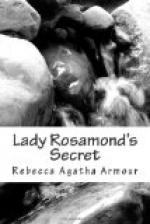Within this apartment are two occupants. Seated, or rather reclining, near the lower window is Maude Bereford, a young girl, graceful and intelligent, but possessing no claim to rare beauty. A second glance increases your approbation. Goodness of heart is indelible upon that face. The other occupant is a lady about sixty years of age. Time had been generous in its demands by drawing small usury from his allotted spoliations. Lady Bereford had been a beauty in her day, and, judging from the skilful devices practised, wished yet to retain her passing glories. Her fair complexion still showed a lingering bloom, the haughty eye still preserved a kindling glance, while her countenance and mien gave evidence of a stronger and more spirited cast of character than that of the young girl here mentioned.
“Maude,” said her ladyship, “what news from Lady Rosamond?”
“Here is the letter, mamma, which you can read,” said the young girl, at the same time placing a daintily folded letter in the lap of Lady Bereford.
With elevated eyebrows her ladyship looked over the contents of the letter. An occasional frown showed the displeasure which some sentences gave to the reader.
“It does not seem to please you, mamma,” ventured Maude.
“I cannot think that Lady Rosamond is very complimentary to her friends in England. She makes no very kind allusions to her former companions here. You certainly will admit that fact.”
“Oh, mamma, I am inclined to believe that you have formed mistaken opinions of dear Lady Rosamond. You see that she refers to scenes wherein all took a part, and I am sure that she is still my friend now as before she left us.”
“Allow me, Maude,” exclaimed Lady Bereford with impatient gesture, “you have neither age nor experience on your side; but I feel convinced that Rosamond has formed some attachment in New Brunswick, which she has cleverly concealed. Throughout her whole letter there is a want of earnestness that betrays her—an unsettled and vague uncertainty dictates every sentence. Sir Thomas did a very foolish action when he gave consent to his daughter’s separation at a time when her nature is most susceptible to the temptations and flatteries of society.”
“Mamma, I do not like to hear you speak thus of dear Rosamond. I love her dearly, and I could not bear the thought of her forming any attachment outside our family.”
“That is one reason why I have been thinking so deeply upon the matter. That Gerald loves his pretty cousin, we know full well, and the mortification of his being refused would be a heavy blow to our pride as well. From a conversation with Sir Thomas a few weeks ago, he gave us every assurance of an alliance of the families. Gerald is living on the consummation of his hopes being realized, while I would fain remind him of the line—’Hope deferred maketh the heart sick.’”
“Mamma, dear, you always seem to prefer the dark side,” returned Maude. “Let us change the subject, as it is surely unjust to Rosamond.”




